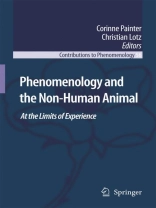The question of the relation between human and non-human animals in theoretical, ethical and political regards has become a prominent topic within the philosophical debates of the last two decades. This volume explores in substantial ways how phenomenology can contribute to these debates. It offers specific insights into the description and interpretation of the experience of the non-human animal, the relation between phenomenology and anthropology, the relation between phenomenology and psychology, as well as ethical considerations.
قائمة المحتويات
Introduction: Phenomenology and the Question of the Non-Human Animal; C.Painter, C. Lotz. Section I: Phenomenology, Ontology, and Anthropology. 1.1 Attunement, Deprivation, and Drive: Heidegger and Animality; G. Kuperus. 1.2 Being Beyond: Aristotle’s and Plessner’s Accounts of Animal Responsiveness; M. Oele. 1.3 How Not to be a Jellyfish: Human Exceptionalism and the Ontology of Reflection; T. Toadvine. Section II: Phenomenology, Psychology, and Language. 2.1 How Do Primates Think? Phenomenological Analyses of Non-Language Systems of Representation in Higher Primates and Humans; D. Lohmar.2.2 Phenomenology and the Study of Animal Behavior; E. Ruonakoski. Section III: Phenomenology and Ethics. 3.1 The Intentionality and Animal Heritage of Moral Experience: What We Can Learn from Dogs about Moral Theory; C.S. Brown.3.2 Appropriating the Philosophies of Edmund Husserl and Edith Stein: Animal Psyche, Empathy, and Moral Subjectivity; C. Painter. Section IV: At the Margins of Phenomenology. 4.1 The Human as Just an Other Animal: Madness, Disability, and Foucault’s Bestiary; L. Carlson.4.2 The Intertwining of Incommensurables: Yann Martel’s Life of Pi; J. Mensch.












